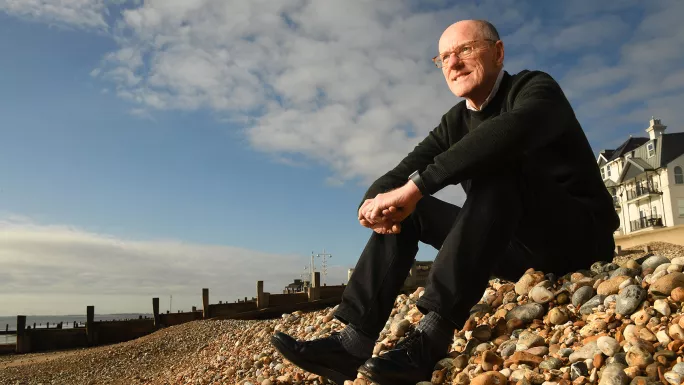Gibb: More targeted funding would undermine school autonomy

Nick Gibb is talking about averages.
The “average” primary school will be around £35,000 better off in May, and the “average” secondary school will be around £200,000 better off, he says, because of a “very significant increase in school funding” announced last autumn.
That increase was based on average projections of costs - both staff and non-staff costs - taking into consideration average energy price rises and the impact of inflation on an average school.
“The average extra funding for schools will be manageable for those schools,” says the schools minister.
But when the funding package was first announced - it equates to a 15 per cent rise in funding over two years, according to the government - many school leaders were quick to point out it was inadequate.
School funding crisis
Those with higher proportions of pupils with special education needs and disabilities (SEND) - many of whom were funding interventions without financial support while waiting for an education, health and care plan - and those with crippling energy bills said redundancies were likely if they were to make ends meet.
Others said the perfect storm of inflation and projected staff wage increases would be impossible to weather.
The accusation was that the “average” school in the government projections was a myth. Does Gibb concede that point?
“Of course there will be schools either side of the tip of the bell curve, but that’s how our system works,” he says. “We have to deal with averages because we have autonomy in schools in how they spend their money.
“If we don’t do that, if we want to make sure that every bit of school spending is covered by these increases, then we are essentially controlling what schools spend. We don’t want to undermine autonomy.”
What about the fact that those on the “wrong” side of the curve will predominantly be those schools not in large trusts, or those that haven’t yet become academies? Is this actually a lever to force academisation, a not-so-subtle message of “to stay afloat, join or create large trusts”?
Gibb says not. He reiterates that if schools want autonomy, then the government must work with averages - and the result is that the funding settlement will affect schools differently. Support is there, he adds, for schools that are “seriously struggling”.
But he does say that a trust-led system “is the future”, as it brings multiple benefits to the workforce and curriculum, and because “overhead costs can be dealt with more efficiently through a MAT”.
“That is why it is the vision for our system,” he states.
Covid’s impact on education
It’s clear from speaking to trusts, though, that we’re back to averages here. Some “large” trusts - comprised of more than 15 schools - say their scale makes the financial package manageable. But other trusts of that size say the opposite. And many more under that 15-school marker also say the settlement will be inadequate.
So, why the disconnect? Is part of the issue that in the financial planning of government there has been an underestimation of the impact of Covid on school finances (“average” or otherwise)? And is a true calculation of the cost of Covid even possible?

There are multiple costs here, owing to the increase in interventions, staff and time needed to support pupils with the academic and pastoral scars the pandemic has left. Schools are footing the bill for all this and also the retreat of other public services.
Sir Kevan Collins put a price of more than £10 billion on this recovery at a time when the full extent of the issues was not yet known. Many indicators suggest things are worse than he feared.
So, did the government come up with a different figure for Covid recovery or are schools managing with far less cash than Sir Kevan believed was necessary?
Gibb stresses that Covid recovery is a priority for the government, particularly for those children with less time left in school. He says “there are calculations that calculate the cost of lost time in education - they are doable, they are based on all sorts of calculations”.
When asked for these calculations, the Department for Education sent over a link to a study from the Education Policy Institute and stated that Gibb was referring to multiple studies of this nature. That EPI study looks at levels of pupil learning loss only, and does not calculate a cost of correcting that loss.
Restricted public finances
Gibb does admit that the nature of government is that departments compete for money from the Treasury, and that the amount of money on offer was restricted by the pandemic.
“In the context of what is affordable, it is a considerable amount of money [that schools have received],” he says. “I think we have done as well as we could. You are always competing with all the other demands on the Exchequer, at a time when we have borrowed £450 billion to get us through the pandemic. That £450 billion is a cost for us all.”
Going into the next academic year knowing that every other sector is struggling too probably won’t give school leaders much comfort. And the fact that they still don’t know how far staff wages will increase will be causing huge anxiety.
Gibb confirms that the government won’t be going back to the negotiation table with the unions and will wait for the School Teachers’ Review Body recommendations. But he doesn’t believe relations with the unions are poor. In fact, he says they are “good” - that he has known the union leaders for a decade and is “always keen to talk to them”.
“We have had good relations in the past and will continue to have those,” he says. But, he says, strikes are “not the way to deal with pay negotiations”.
Further stalemate - and strikes - seem inevitable. And that added disruption in combination with the financial pressures schools are under will likely make education a key battleground going into the next election, and not just for the “average” voter.
You need a Tes subscription to read this article
Subscribe now to read this article and get other subscriber-only content:
- Unlimited access to all Tes magazine content
- Exclusive subscriber-only stories
- Award-winning email newsletters
Already a subscriber? Log in
You need a subscription to read this article
Subscribe now to read this article and get other subscriber-only content, including:
- Unlimited access to all Tes magazine content
- Exclusive subscriber-only stories
- Award-winning email newsletters
topics in this article



